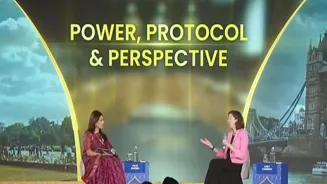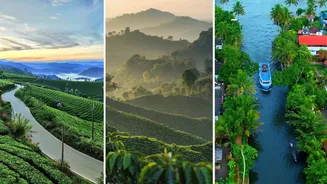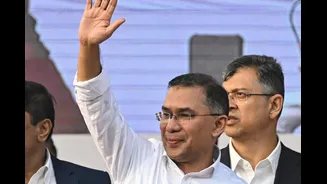British High Commissioner to India Lindy Cameron on Thursday urged India to think beyond its traditional role as a voice of the Global South and to embrace its position as a “future superpower” on the world
stage.
Speaking at SheShakti 2025, News18’s flagship event celebrating women leaders, Cameron reflected on India’s rising global influence, the strategic evolution of UK–India ties, and the unique strengths women bring to diplomacy.
In conversation with senior journalist Palki Sharma, Cameron said, “To be honest, I think India should be more ambitious than just being a leader of the Global South. India absolutely is that, but it is also, perhaps more importantly, a future superpower of tomorrow.”
She noted that India’s geostrategic position, demographic scale, and economic momentum make it indispensable to global decision-making.
“As India evolves and grows economically, it becomes impossible to ignore. Indian prime ministers of tomorrow, and indeed today, will find there are very few global issues on which the world doesn’t want to know what India thinks.”
From Shared History To Shared Future: The UK–India Story
Describing the bilateral relationship as “a living story of partnership”, Cameron said the UK and India are bound not only by their past but by deep and dynamic present-day ties.
“We’ve just celebrated that partnership with Prime Minister Modi’s visit to Chequers Estate, not only to witness the signing of the Comprehensive Trade Agreement, but also to launch India-UK Vision 2035, which is our roadmap for the future of the UK–India relationship.”
While acknowledging the complexities of colonial history, she pointed out that it had also laid the foundation for shared cultural references, linguistic bonds, and vibrant people-to-people connections. “We have a complicated history, but that history gives us many shared cultural reference points. It gives us at least one common language, arguably many more. British universities are well-known in India, just as there are over two million people of Indian origin in the UK. That’s one of our superpowers.”
Cameron said the UK–India economic relationship is poised for a major leap with the Free Trade Agreement (FTA) expected to add £25 billion to the UK’s GDP in the long run. But she emphasised that the partnership goes beyond trade numbers. “This is not just about exports or imports. It’s about Indian businesses investing in the UK, and British companies wanting to be part of India’s extraordinary growth story—6.5 per cent GDP growth, a market of 1.4 billion consumers. Who wouldn’t want to be part of that?”
A New Phase Of Collaboration
Beyond economics, Cameron said sectors like education and innovation are at the heart of the bilateral future. She pointed to the active interest shown by UK universities under India’s New Education Policy (NEP). “We’ve got seven UK universities that already want to be part of the NEP framework. I was at the opening of the University of Southampton’s campus in Gurugram just a month ago, and many more are ready to follow.”
Cameron also highlighted the potential for cooperation in the defence sector, particularly under India’s Make in India campaign. “There are real opportunities for partnerships between UK and Indian businesses in defence manufacturing, helping diversify and strengthen India’s defence capabilities.”
‘Use Your Visibility, That’s Your Superpower.’
Turning to her experience as a woman diplomat, Cameron said that while women may not always face a “higher bar”, the spotlight is often harsher and more visible.
“I’m not sure the bar is higher for women diplomats, but we are certainly more visible. I often joke that my male colleagues don’t agonise over whether to wear a new suit or a grey one—but I do, and people notice.”
She said rather than seeing this visibility as a liability, women should see it as an opportunity. “When you walk into a room filled with men called Arthur or Bob, you will stand out. Your voice is more likely to be heard. You may even be remembered more. Use that moment. That can be your superpower.”
She added that this advice is something she often gives younger women in the foreign service—“Use your visibility. Use it wisely and effectively.”
A Confident Partner In A Changing World
The session concluded on a note of optimism and shared ambition. Cameron said India and the UK are two of the world’s largest democracies and economies, and their partnership is anchored in mutual respect, shared values, and future opportunity.
“We are the world’s sixth and fourth largest economies. We are democracies with diverse voices. We matter, and we matter to each other.”
As the global order continues to shift, Cameron said, India’s voice will not only grow louder but will also help shape how the world responds to challenges of the future, from trade to technology, security to sustainability.














